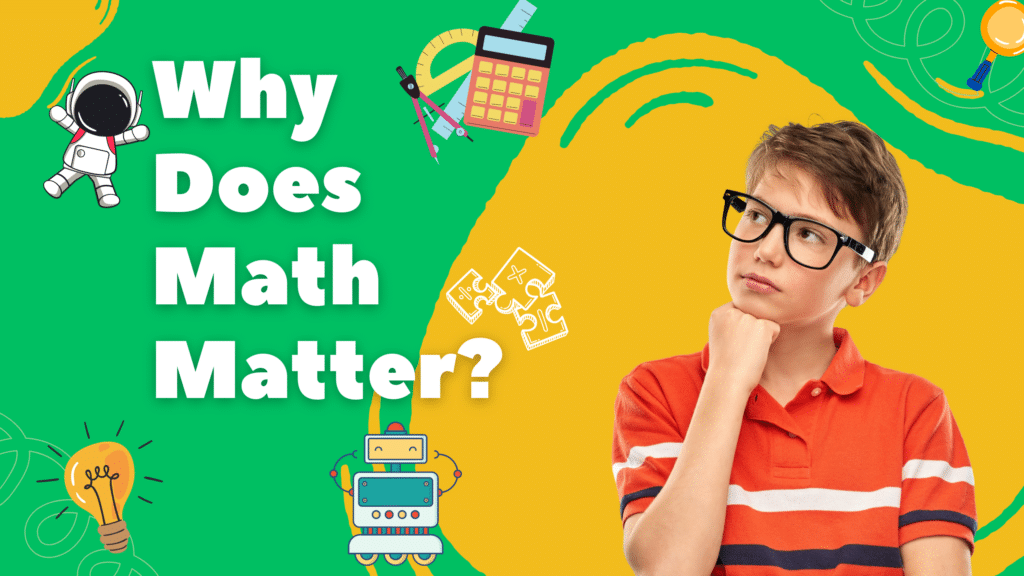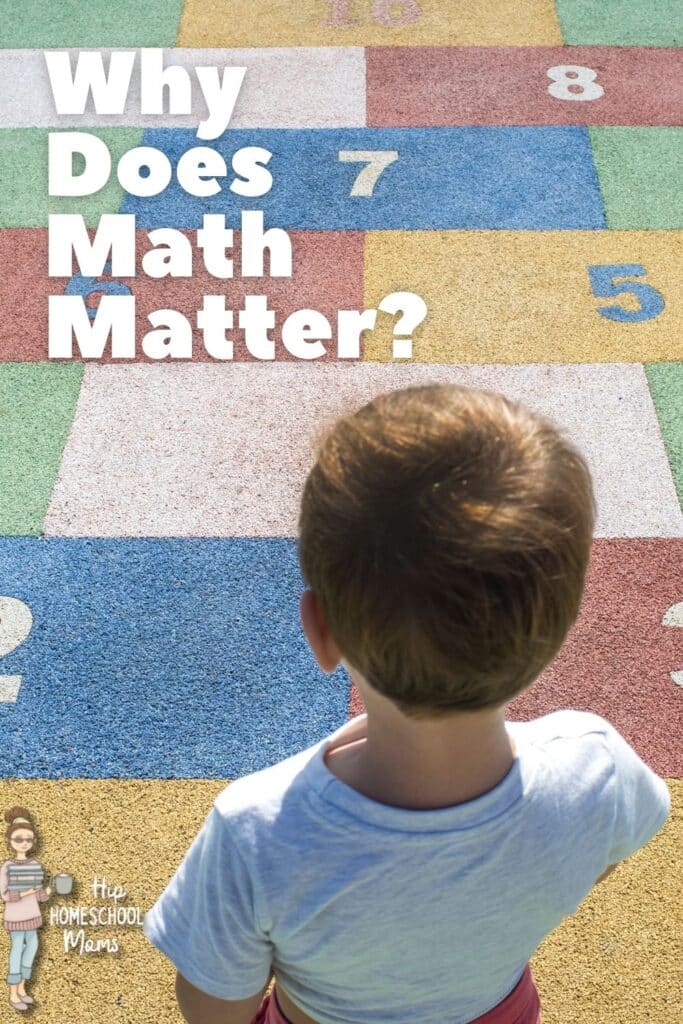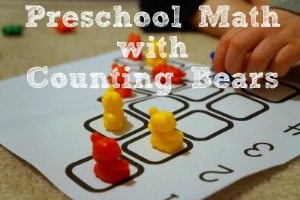Why Does Math Matter For Our Kids?
“Why do I need to learn algebra? When will I ever use this in real life, anyway?”
Have you ever heard your kids say this? Or maybe you remember saying it when you were a student! Why does math matter?

I distinctly remember having a similar complaint myself as a high schooler who did not enjoy my calculus class. I liked algebra fine, but something happened in calculus where I just didn’t get it. I didn’t understand what the symbols meant, or what the point of any of the equations were. When would I ever use this math stuff, anyway?
I viewed the higher math course as something to survive, forcing myself to perform the procedures to get the answer I needed to earn the grade I needed. When I was finished with the class, I was relieved because I told myself, “I will never need this again!”
I don’t think I’m alone here. I think this struggle with asking “Why does math matter?” is something a lot of us experience. Even if we loved math as younger kids, the passion dies out as the procedures become increasingly complex and the unanswered question of “Why does math matter?” becomes tangentially more frustrating.
Even though math (especially higher math) can commonly be frustrating for kids, there are some truths that must be addressed about young people struggling with math today. Specifically, there are three truths I want to discuss.
- Math does matter. Yes, higher math, too.
- If we change the way we think about it and teach it, learning higher math can become more fun, more accessible, and easier to apply to real-world applications.
- Not only is this possible, but it’s also vital, particularly for the upcoming generation of learners.
Why Does Math Matter More for Today’s Kids?
It’s always important to talk about “why math.” So, why does math matter?
Let’s discuss the last point first. The current generation of students has grown up in a digital age that is changing exponentially (see what I did there) from year to year. Those in the space industry call today’s kids “the Artemis Generation,” after NASA’s current space program that is still in its early stages. That’s because, in these kids’ lifetime, the Artemis program is hoping to build a station on the moon and send people to Mars—yes, Mars!

This example shows that the tasks these young learners have the potential to accomplish in their generation are unprecedented. In many cases, the things they will achieve are impossible for us even to imagine. However, we know that a lot of these things will only be possible through a deep understanding, and practical grasp of STEM subjects—math included.
According to the U.S. Department of Labor, “In 2021, there were nearly 10 million workers in STEM occupations and this total is projected to grow by almost 11% by 2031, over two times faster than the total for all occupations.” In other words, the growing rate of jobs in science, technology, engineering, and mathematics fields are growing two times faster than all other occupations combined!
By the time our kids are adults, it’s likely that most jobs will involve some degree of STEM understanding. And this is not limited to kids who grow up wanting to build rocket engines, either. An understanding of mathematics and technology is quickly becoming more essential across all fields of industry, even within ones we would have never expected.
Previously, “artsy” or “literature minded” (I was one of these) students may have been able to say they would grow up to have careers that wouldn’t involve math and science anyway, so “why does math matter?” This generation’s kids can make no such claims. Even today, artists need digital design skills. Writers need to understand algorithms and are currently trying to navigate an AI world.
Anyone hoping to have a career in any creative industry also needs to understand how to interpret data and analytics as part of marketing. Who can predict how much more important an understanding of STEM-related topics will be to the creatives of the future? I can’t. However, I can confidently say that it will be more important than ever as mathematical concepts become a more ingrained part of how we think, work, and live.
Practically speaking, most of the jobs our kids will have in the future (including many jobs that don’t even exist yet) will have connections to math. This is one vital reason that math matters more than ever for today’s students. However, it also possibly provides a key to making math more accessible to learn.
This involves a change in how we think about and approach math.
Changing How We Think About Math
Do you remember when you were first learning how to add? (Or if you are a longtime homeschooling parent, maybe it’s easier to remember teaching your own children how to add.)
Teaching kids that 3 + 4 = 7 is so much easier when you use their favorite candy to illustrate the concept, right?
They can picture what the addition problem means, for one thing. It’s easier to envision why math matters, and they get a sweet reward for their efforts.
I know that my daughter is always able to picture and solve simple addition or subtraction problems much more quickly if I gave her a real-world example.

Sure, kids can learn to memorize math facts quickly, and this can be very helpful for addition, subtraction, and multiplication facts when they are younger. However, if you don’t understand why math matters and what the math actually means, then what is the point?
I think this is what’s happening with a lot of kids who are striving to learn higher math and become frustrated. The meaning is missing. They can’t understand the significance behind many of the symbols and expressions being used, and this results in memorization and robotic equation-solving that has no real connection to anything.
And we know when learning isn’t connected to anything else, it has trouble sticking. This is especially true in subjects that can already be challenging, like higher-level math courses.
Furthermore, if we have trouble making connections to (and truly understanding) something, that thing can seem pointless. That’s when students will end up asking, understandably, “Why do I have to learn this?” They don’t know why math matters.
Having a point is important because meaning provides motivation. As we’ve already discussed, math does and will have a point for today’s students, more than ever. We need to help them understand this and use it to make math more exciting and relevant.
So how do we make that connection for them? How do we change the way we teach math, so that students can change the way they learn it and perceive it?
You may have heard it said that higher math is its own language. When talking about the best way to learn math, I think we must keep this comparison in mind. You wouldn’t learn a language with no reason to want to speak it, right? And you also wouldn’t (and can’t) master a language simply through memorization of vocabulary words.
To become fluent in a language—or in learning higher math—you must develop an understanding of its structure and logic. This is the part that allows you to speak it with confidence, and to have fun doing so. Understanding its logic and structure is also the key to making math fun, giving it deeper meaning, and helping your child learn why math matters.
Just like learning a language opens exciting possibilities for travel and conversing with others, a deep understanding of higher math can unveil the way it really works and open doors to all kinds of other learning and experiences. And, as we’ve been discussing, this is especially true for today’s learners!

Making the Switch: Applying These Changes in Your Homeschool
If you’ve been reading this and thinking that you’d like to change your approach to math, or that maybe you need a total overhaul, there are definitely some simple changes that can help. There’s a big movement today for making all STEM subjects more approachable for kids, especially for those kids who have struggled with math in the past or may have just said they are not “math people.”
You may have access to a STEM club in your area that can help get your kid excited about robotics or engineering by making it fun and hands-on and enable them to learn why math is important in real life.
LABWay: Learning Logic and Why Math Matters
But still, making higher math approachable is no small feat, and a lot of parents feel like it’s not a task they can tackle alone. One resource we highly recommend is LABWay Math! Their entire philosophy is based on teaching the logic of math, particularly higher math, in a way that makes it engaging and understandable for kids.
LABWay Math is a terrific online resource that uses Math Coaching to customize the experience of mastering math and understanding why math skills are vital to learn in this day and age.

Their online Math Coaching is different from online tutoring because the goal is to help the child change the way that he or she thinks about math, as we’ve discussed today. They also work with homeschool parents, which is a terrific angle to come from. They work with the curriculum you already have in place and “add the elements most curriculum and lessons are missing.”
LABWay’s Math Coaching program doesn’t seek to replace the homeschooling parent but to support and work with that parent. Math Coaches work with students in small groups, which they believe helps keep students engaged in the process of thinking mathematically. (This also means that it costs a lot less than hiring a math tutor.)
LABWay Math is original in its approach of focusing on the logic of math, providing deeper meaning, motivation, and fun to the process. For many students who are struggling, this is the missing piece, the answer to the questions of “Why does math matter?” and “How will I use it?”
Lastly, in helping change the way your learner thinks about math, you can never go wrong with looking to the future. What does your child want to do one day? What are his or her interests?
There are plenty of ways to delve more deeply into the practical applications of math in whatever field of study they are passionate about (yes, even art!). When kids can see themselves in the future doing something, and using math to do it, it can help change how they view math in the present!
The truth is that math matters. And, in our rapidly changing digital age, it’s going to matter infinitely more to our upcoming “Artemis generation.”

Because of this, we must find new ways to make higher math more engaging and accessible to our young learners. In changing how we think about and teach math, it’s helpful to think about math like a language, with a logic and structure that can be fun and engaging to learn and explore.
If you’re struggling with this in your homeschool, there are many ways you can shed new light on math by bringing in hands-on experiences, seeking out professional resources like LABWay Math Coaches, and looking to the future for inspiration!
You can also work to make more connections to math in everyday activities, especially if it’s something your child already enjoys doing. For instance …
- Baking and cooking are easy ways to work on fractions.
- You can also incorporate math games into your family travels.
- There are games that focus on sequencing and coding skills, like Team Digger.
- If you love gardening, there are plenty of creative ways to learn math in the garden.
Do you have any thoughts about the role of math for the future generation, or ideas for changing how we can present higher math more effectively? How have you helped your children understand why math skills are important? Leave a comment and let us know!
For more detailed information about how LABWay Math works, check out this LABWay Math review by Rachel Lance.













